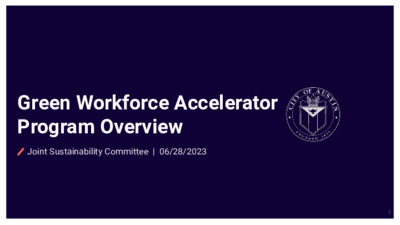3. Innovation Office support of Austin Climate Equity Plan Implementation Presentation — original pdf
Backup

Green Workforce Accelerator Program Overview Joint Sustainability Committee | 06/28/2023 1 1 What and Why 2 Green Workforce Accelerator The GWA is a collaboration led by the Innovation Office between the Office of Sustainability, Office of Resilience, PARD, EDD, and ARR to expand the number and capacity of organizations providing good green jobs and green job training in Austin. ● The Climate Equity Plan has the overarching strategy of creating equitable access to good green jobs ● Several other departments and programs - e.g. Resilience, EDD, ARR, PARD - have initiatives that call for or support green jobs and equitable workforce development ● Historic IRA, BIL, and CHIPS and Science legislation is investing over $1T in clean energy and infrastructure, could create 12 million jobs - but no guarantee they will be good jobs that are accessible and provide career pathways to those who are most affected by climate change and have been locked out of economic prosperity. ● This program gives the City a vehicle to support community-based good green jobs and programs that help pursue our climate and equity goals. How we got here ● Fourth iteration of this program model for green jobs (others in 2019, 2021, 2022), seventh for all focus areas (affordability and homelessness, displacement mitigation 2019; homelessness 2023) ● Innovation Office developed the ACCC which included two community-based research studies to better understand what people want and need from green jobs programs, and an Austin green jobs economic analysis by UT. ● Number of partners providing training for and access to green jobs is low. Even less improving access for BIPOC, low income, LBGTQIA+, women, and other groups highly affected by climate impacts but with low access to green careers. ● City and its partners have and will grow significant power and influence for creating and supporting good green jobs based on the grants, direct payment tax credits, and infrastructure projects available through legislation. Now is the time to support and advance good partners. (Some of) the results from past programs ● ● ● ● ● Since 2019, 45 orgs enrolled/completed programs on affordability, homelessness, green jobs and climate change, workforce development, and anti displacement ● Created capacity for over 100 new jobs or job placements for residents 16 new programs or areas of service launched serving thousands of residents ● Majority of org participants go through major restructurings, growth, or formalizations or their organizations $5M+ in additional grants, investment, revenue, and contracts, many from the City, which represent new solutions being adopted and incremental investment ● At least 5 significant collaborations between 2+ orgs 4 orgs enrolled in a second program (ours or others) to continue progress ● National visibility (Queer Eye, Today Show, EarthX, Aspen Institute, SXSW) Stronger, more cohesive ecosystem of orgs in Austin Approx $500K in grants and program costs over 5 yrs. Biggest project to date underway: 21 orgs, $1.05M. Lessons for success ● Programs meant for marginalized or new orgs need very deliberate recruiting and relationship building. ● Unrestricted grants to go through the program are a must. $7.5K - $15K / org. ● Low barrier + high accessibility is crucial for small, new, and underdeveloped orgs. Includes application, program structure, grants and payments, reporting. ● Outcome expectations: program meant to grow and build capacity, not to perform X number of Y things. Learn with them. ● Partners are key. We used them from day one. Leverage their capacity, expertise, connections. ● Bring others in your org along for the ride and transfer the model to them. 2 How 7 Program structure ● BIPOC led and/or serving organizations focused on creating good green jobs or training for jobs, targeted at areas of opportunity from IRA, BIL CHIPS and Science Act. ● Focus on equity, accessibility, and community involvement in recruiting, application, and selection process. ● Needs assessment to determine areas of strength and opportunity. ● $7.5K per org for technical assistance and direct investment. ● Accelerator program to strengthen organization capacity, develop new services, or strengthen existing. Includes $7.5K unrestricted grant per org. ● Work with City departments and partner organizations create pathways for participants. ● Data collection at 3 and 6 months post program completion to assess outcomes. ● Goal is 10-12 participating orgs. Outcomes ● More equitable access to good green jobs for residents. ● City has more partnership opportunities for IRA, BIL, Climate Equity, ACCC, etc. ● Stronger ecosystem of organizations focused on a just climate transition. ● City and collaborators get exposed to new approaches and orgs. ● GHG emissions reductions, more prosperous community. ● Potentially permanent model for green jobs and training development. 3 What’s Next 10 Next steps ● Contract to Council August 31 ● Finalize program focus, structure, and content with collaborators and community partners ● Recruiting kickoff planned for September ● Accelerator portion will conclude in March/April 2024 11 Opportunity areas ● Engage the network that didn’t get accepted. Lot’s of untapped potential. ● Keep momentum going. There is a drop off in support and orgs feel it. ● Creating pathways and filling gaps between solutions that are currently available. ● Refine impact metrics and evaluations, better and longer-term tracking and synthesis. ● Creating more direct pathway to contract with City partners, or feed into City jobs. Thank You! Questions? Daniel Culotta | City of Austin Office of Innovation | daniel.culotta@austintexas.gov